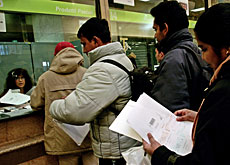Voters tighten asylum and immigration rules

Swiss voters have approved tougher regulations on asylum and have limited immigration for citizens from outside the European Union.
With most of the votes counted in Sunday’s ballots, some 70 per cent of the Swiss were behind the measures. A third ballot – to prop up the country’s ailing old-age pension scheme with profits from the National Bank – failed.
Near-final results show approval rates of up to 80 per cent for the tighter asylum and immigration laws in some cantons.
The pension fund proposal failed to win a majority of cantons, which is needed for a people’s initiative to pass into law. It appears to have been rejected by up to 60 per cent of voters, according to exit polls.
On asylum voters were evidently convinced by the government’s arguments that harsher measures against asylum abuses were necessary to avoid social tensions and provide protection for those fleeing persecution.
A coalition of centre-left parties, trade unions, churches and aid organisations had forced the vote, arguing that the reforms went against Switzerland’s humanitarian tradition.
They added that new law, approved by parliament last year, would make the country’s rules among the most restrictive in Europe.
Under the new measures applicants who cannot produce identity papers within 48 hours without a credible reason are excluded from asylum altogether. All rejected asylum seekers are barred from regular welfare benefits and can apply only for food and shelter.
A controversial clause in the legislation will mean jail sentences of up to 24 months for those refusing to leave Switzerland.
Justice Minister Christoph Blocher of the rightwing Swiss People’s Party – who is at the forefront of the reform – warned of an increasing number of asylum requests and high costs for the country’s welfare system.
Foreigners
The amended law on foreigners in principle limits immigration for citizens outside the European Union and the European Free Trade Association (Efta) to highly skilled labour.
It also aims to encourage integration, in particular by language courses, while cracking down on human trafficking and marriages of convenience.
The cabinet, as well as three of the four main parties, are in favour, but opponents criticised the restrictions for family members of immigrants and harsh jail terms for illegal immigrants who refuse to leave the country.
There are also concerns that the legislation ignores the fate of the estimated 100,000 illegal immigrants who already live and work in Switzerland.

More
People’s initiative
Old-age benefits
A proposal to use some of the annual profits of the National Bank to plug expected shortfalls in the state pension scheme was opposed by government, a majority in parliament, the business community and the central bank.
Currently the money is divided between the country’s 26 cantons (two-thirds), and the federal government.
Opponents say the plan is not sustainable and fails to tackle the structural problems of the pension fund.
They also claim it would have put the National Bank under undue political pressure and threaten monetary stability.
The proposal, launched by the Social Democrats and the trade unions, is the latest attempt to secure the financial future of the state pension scheme, which is facing huge deficits because of the country’s ageing population.
swissinfo

More
Referendum
The vote on old-age benefits required a majority of voters and cantons to pass at the ballot box.
The two referendums on tightening asylum and immigration rules needed only a simple majority of voters.
About 4.84 million people over the age of 18 have the right to vote in Switzerland; the average voter turnout is around 40%.
Asylum applicants who cannot produce identity papers within 48 hours without a credible reason are automatically excluded. Rejected asylum seekers are barred from regular welfare benefits and qualify only for food and shelter.
Rejected asylum seekers who refuse to leave the country face prison terms of up to two years.
The amended law on foreigners limits immigration for citizens outside the European Union and the European Free Trade Association (Efta) to highly skilled labour.
It also aims to encourage integration, in particular by language courses, while cracking down on human trafficking and marriages of convenience.

In compliance with the JTI standards
More: SWI swissinfo.ch certified by the Journalism Trust Initiative













You can find an overview of ongoing debates with our journalists here . Please join us!
If you want to start a conversation about a topic raised in this article or want to report factual errors, email us at english@swissinfo.ch.